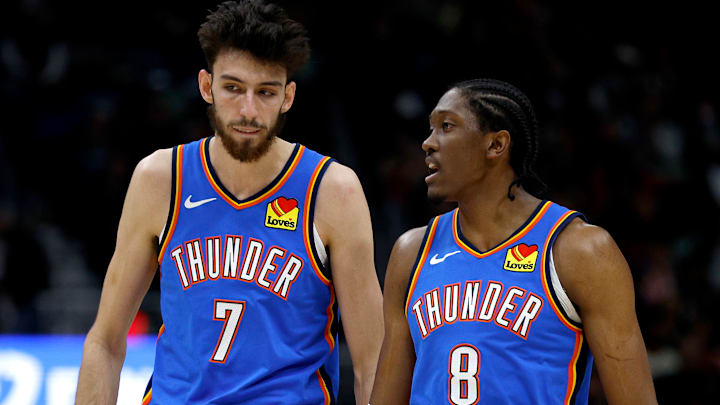It’s nearly impossible to do anything that flies under the radar after winning an NBA championship. The Oklahoma City Thunder have managed to do it anyway—by negotiating contract extensions with Chet Holmgren and Jalen Williams that don’t include player options at the end.
Most naturally gravitated toward the raw dollar figures of their deals. Understandably so. A conventional five-year rookie max extension is worth almost $240 million. J-Dub’s contract, specifically, has a chance to be worth $287.9 million. Who cares about player options a half-decade from now with that kind of money in play?
The Thunder do. As they should. The structure of these deals just might help them extend the time J-Dub, Holmgren, and Shai Gilgeous-Alexander wind up spending together.
The Thunder just saved a bunch of money
First thing’s first: Don’t let anyone tell you the Thunder’s Big Three has to be broken up after next season, or even the year after. Yes, Oklahoma City is about to get veeeeery expensive. It is also set up to navigate the rising costs of its star trio better than any team in league history.
Draft picks galore arm the Thunder with the ability to find and develop cost-controlled talent around them. A bevy of current players on reasonable contracts make it easier to retain and trade off supporting-cast members as the front office sees fit.
The contracts for Holmgren and Williams play a pretty big role, too. Signing deals without player options prevents them from entering free agency or starting a new extension before the 2031-32 season. That makes a huge difference.
Right now, both J-Dub and Holmgren are projected to earn $54.6 million during the 2030-31 campaign. If they had player options for that season, they could enter unrestricted free agency in 2030, where they’d be eligible to sign for a max starting salary of $60.2 million apiece. That’s $5.6 million more per player, and $11.2 million total.
These savings only climb if one or both of them are supermax eligible. In this entirely plausible case, they’d be up for max salaries of $70.2 million in 2030-31. That’s $15.6 million more than each is on the books for right now—and $31.2 million total.
OKC kicked the can, and that matters
Projecting so far out into the future can ring a little hollow. Competitive life cycles change on a whim in today’s NBA. The Thunder’s case is different. A half-decade from now, both J-Dub and Holmgren will be 29, while SGA will be only 32. That’s in-their-prime territory for all of them.
Paying through the teeth or busting them up will become unavoidable at some point. If Chet and J-Dub are who the team believes them to be, they will hit supermax eligibility the Thunder must reconcile in time for 2031-32.
Yet, if not for the player option-less extensions they signed, Oklahoma City would have to grapple with that reality an entire year earlier. When you are competing at this level, with the look and feel of a potential dynasty, that absolutely matters.
And don’t make the mistake of thinking any of this was a given. Player options aren’t as common in rookie extensions, but certain types of cornerstones have the leverage to get them.
Holmgren and J-Dub are those types of cornerstones. Their absence of player options isn’t just good business by the Thunder, or a harbinger of how tight-knit this group has become. It is the subtle footnote that could help this team stay together longer than most expect.
